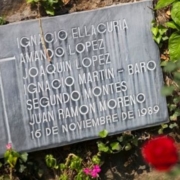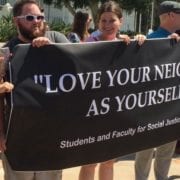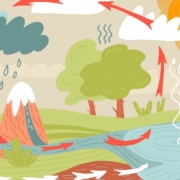One Family Under God
BY MARISSA FLORES MADDEN | November 6, 2023
Sunday’s Readings
A tour group from a local Catholic parish was passing through our Catholic Charities Family Immigration Services department when the guide asked me to share with our guests a bit about our work.
Of course. That’s easy. Mostly family based petitions. Some DACA renewals. And over the past two years, we’ve responded to the times by taking on new types of cases, working with Afghans since the U.S. evacuation, and Ukrainians, since the war began. Done. Back to making copies.
But I hadn’t anticipated the questions. Not easy. Not easy at all.
“Aren’t you concerned that you may be aiding criminals in your line of work? What if you’re contributing to Mexican drug cartels?”
Feeling incredibly defensive, I honestly can’t remember how I answered the questions about my potential partnership with drug cartels and hardened criminals. But I’ve watched enough episodes of Ozark to confidently conclude cartels won’t be seeking my legal services any time soon, despite my proximity to the show’s titular location.
As I was replaying this tour group Q&A in my mind, I decided to review yesterday’s readings. As it turns out (and this should come as no surprise to any of us), Scripture can and should inform my response to future questions regarding my work.
The theme of familial love is woven throughout the readings from Malachi and Matthew—each in its own way, inviting us to relate to God as a loving parent, and to relate to others as loving siblings who care for one another.

And just as I was once again replaying that Q&A and reflecting on these readings, I received an email from the USCCB’s Justice for Immigrants campaign. Their message contained the tagline: “We are one family under God.”
Timing is everything.
The questions put to me about immigration weren’t really about crime. The questions were about family.
The endless U.S. immigration debate isn’t about immigrants and whether or not they’ll be perfect community members. It’s about us, the debaters, and how we choose to relate to and treat others—immigrant or not—with hospitality or hostility, with welcome or suspicion, with awe or judgment, with grace or condemnation.
Both the Hebrew scriptures and the Gospels invite us, and oftentimes even challenge us, to treat any given person as we would our own families. And when I think of my family—the quirks, the flaws, the support, the love—I quickly note that we’re not perfect; and still, I try my best to always presume the good.
How can we offer that same kindness beyond our immediate loved ones to immigrants, refugees, people in prison, and, indeed, to all of humanity?
For Reflection:
- How might you be called to offer kindness and familial love to those beyond your immediate circles?
Marissa Flores Madden is a Department of Justice Accredited Representative in the Family Immigration Services program at Catholic Charities of Central and Northern Missouri and the creator of the Mercy Moments podcast series (cccnmo.diojeffcity.org/mercy-moments). Before moving from Cleveland to Missouri in 2021, she taught Catholic Social Teaching (CST) to high school seniors and worked in campus ministry leading immersion retreats to Ecuador and the U.S.-Mexico border. Reflecting on these experiences through the lens of CST continues to inspire her work with immigrants today.









Your article was so tender. Thank you! I had the opportunity to volunteer on the border in El Paso. What I found, loving people who were looking for safety and a better life for their families.
I hope I will always be a welcoming presence for all I encounter. I ask for God’s LIGHT to help me seethe beauty in all I encounter!
Thanks, Cathe. I’ve also had the opportunity to visit and volunteer in border communities. They were certainly transformational experiences.
“How might you be called to offer kindness and familial love to those beyond your immediate circles?”
This is such an excellent question as we wander through airports, parking lots, stores, churches and many other places where people are weary and confused. This is a time to do the immediate small things that helps each person realize they are not alone – God is with them and me! Whether it is getting a cup of coffee, helping with packages, reaching for a way to alleviate their load without startling them. It is such an opportunity for grace both for me and the person receiving the kindness. There are many opportunities to soothe others in their pain, noticing the journey and reaching to comfort the other who is suffering in so many different ways. Our touch is such a healing touch that Jesus has called us to do as He did so many times in the Gospel stories.
Agreed! And such simple gestures can have a profound effect on all of us.
On a recent visit to Ireland, we stayed at the Nano Nagle centre where there is a quilt on display. One embroidered block has the inscription: “To be created is to be related”. I think that just about sums it up. We are each of us a child of the same loving father and we should act like we are his children!
What a beautiful sentiment, Patricia!
Reaching out is about listening and sharing our stories. There are those who beg in our streets and on our trains who can’t believe that there are people in our society who also have nothing. It is hard to believe that in a western country that is so much about democracy and equal opportunities and rights that there are many Austrian women citizens who receive no pension. And when their husband dies they only get 60% of his pension which is not enough to run the family home and they are forced to move out and if they are lucky find an affordable flat. Those who are not so fortunate end up on the streets and eating at soup kitchens.
Agreed. Taking time to be present and listen to the experiences of others can be healing for both the listeners and those sharing their stories.